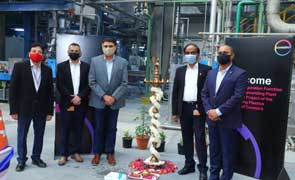Expansions: Covestro expands PC compounding site in India; BASF builds new plant for alkylethanolamines at Antwerp site

Against the back of rising demand in Asia, German materials firm Covestro has started up two polycarbonate (PC) compounding production lines at its Greater Noida plant near New Delhi in India. The new plants are intended to meet the growing demand for compounded plastics, particularly for the automotive and electrical and electronics industries. In total, more than 25 new jobs were created.
In addition to its extensive PC portfolio, the company says it now has more than double the plastic finishing capacity there than before and offers improved customer service. The project is also in line with the Indian government's "Make in India" initiative, which aims to encourage investment in the development and manufacture of products in India.
Nicolas Stoeckel, Head of Operations in the Engineering Plastics segment, said, "We have invested in compounding capacity from Germany to China to India to further improve our competitiveness and customer focus. With the recent expansion in Greater Noida – a key component of our Engineering Plastics Business Entity's global footprint – we continue to build capacity to better serve our customers in the region."
In Greater Noida, Covestro has addressed capacity bottlenecks several times in the past, so that in 2017 the site was able to meet about 50% of domestic demand for compounded PC, while the other half was supplied from the Map Ta Phut site in Thailand. Then, in the same year, the decision was made to expand compounding at the Indian plant. It was implemented as planned despite obstacles such as intermittent high levels of air pollution and the Covid-19 pandemic.
It is also Covestro's first project worldwide under its Blue Print concept for compounding. This involves largely standardiSing the design of Covestro's compounding lines, enabling the company to build new lines faster and more cost-effectively in the future.

In other news, German chemical firm BASF is building a new world-scale production plant for alkylethanolamines at the Verbund site in Antwerp, Belgium. After the planned start-up in 2024, the company will increase the global annual production capacity of its alkylethanolamines portfolio containing, amongst others, dimethylethanolamines (DMEOA) and methyldiethanolamines (MDEOA) by nearly 30% to more than 140,000 tonnes/year.
With a high degree of local backward integration, BASF says it ensures a reliable and sustainable production of alkylethanolamines. With production facilities for this portfolio at its sites in Ludwigshafen, Germany; Antwerp, Belgium; Geismar, Louisiana, US, and Nanjing, China, BASF is one of the world’s leading producers of alkylethanolamines.
“We see a continuing, growing demand for alkylethanolamines in a broad range of industries such as water treatment, detergents and gas treatment over the next years. The investment in Antwerp will have a positive effect on the available capacity for alkylalkanolamines in BASF’s amines Verbund, therefore supporting our continued ambition to provide products for our customers’ growth,” said Frank Stein, Regional Business Unit Europe of BASF’s Intermediates division, adding: “This is our clear commitment as one of the globally leading amines producers.”
The versatile alkylethanolamines are mainly used as precursors for flocculants applied in water treatment and in the coatings industry where they act as binders between pigments and resins. Other applications include gas treatment, fabric softeners, in additives for metalworking fluids and polyurethanes.
With about 300 different amines, BASF has the world’s most diverse portfolio of this type of chemical intermediates. Along with alkyl, alkanol and alkoxyalkylamines, the company offers heterocyclic and aromatic as well as specialty amines. The range is completed by an expanding portfolio of chiral amines of high optical and chemical purity.
The products are used mainly to manufacture process chemicals, pharmaceuticals and crop protection products, as well as cosmetic products and detergents. They also serve to produce coatings, special plastics, composites and special fibres.
(IMA)Subscribe to Get the Latest Updates from IMA Please click here
©2022 Injection Moulding Asia. All rights reserved.














